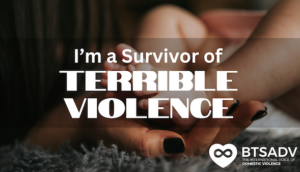
By Jamey Sheesley
When we talk about victims of domestic violence, many people automatically think of women; however, men suffer from domestic violence as well. According to The National Domestic Violence Hotline, 1 in 4 women and 1 in 7 men over 18 in the United States have experienced severe physical violence by an intimate partner in their lifetime.
According to the Hotline, there are five myths that contribute to why men do not report domestic violence:
- Men cannot be victims of abuse.
- Men are the perpetrators of violence, not the victims.
- “Real men” can handle abuse.
- Domestic violence resources are only for women.
- LGBTQ+ identifying men will bring shame to the LGBTQ+ community if they report their abuse.
Domestic violence does not discriminate it can happen to anyone of any gender at any time. Both the media and the world at large have held misconceptions for a long time that men can only be abusers, not victims, which is why many men do not report it. Many media sources only show stories where women have been victims of domestic violence. There is also less promotion for where men experiencing abuse can go to for help. This lack of conversation often causes the men who do come forward to not be taken seriously.
Believe survivors
The first step toward raising awareness for men is by believing them. Do not judge and criticize them. Listen and hear what they say and, most importantly, believe them. When people have the courage to ask for help, and it is our job to listen to them. A good support system is key to healing from domestic violence and can consist of close friends and family members, as well as a therapist, or anyone that can help the healing process.
Unlearn toxic masculinity
How many times have you heard the phrase “be a man”? This type of attitude emasculates men who have experienced domestic violence. Men can feel embarrassed when coming forward because society has told them they have to be strong and if they let someone abuse them, then they are weak. A real man would take charge of the situation and not allow himself to be abused. Enough already, there are strong, capable men out there who find themselves in bad situations just like strong, capable women do. Just because someone is male does not mean they are immune from domestic violence.
It is time we relearn that strength means having the ability to ask for help when you really need it.
Erase stigmas for the LGBTQ+ community
Domestic violence does not just happen in heterosexual relationships. Gay, bisexual, and trans men face extreme backlash for reporting domestic violence. The LGBTQ+ community already faces many stereotypes and people often fear reporting domestic violence because it will only bring more stereotypes and hate toward their community.
According to American Progress, research indicates that domestic violence among same-sex couples occurs at similar rates as domestic violence among straight couples. While men in this community may face some of the same anxieties and fear as a straight man, they actually have more held against them. Not only do they suffer from the abuse, but they also risk being “outed” by their abuser to their friends, family, and co-workers. They may also fear calling the authorities because then they have to reveal their sexual orientation or gender identity to the police. It may also be harder for LGBTQ+ identifying men to have a support system if their friends and family do not know their sexual orientation or gender identity.
Domestic violence does not discriminate it can happen to anyone at any time no matter what type of relationship you are in.
Provide resources for men
Men also feel like they do not have the same resources as women. Many shelters are exclusive to women. However, in 2017 a men-only shelter opened in Texas. At the time, this was only the second shelter of its kind in the United States. According to the National Domestic Violence Hotline, more resources are becoming available to men as society’s views and domestic violence affecting men are changing.
Break the Silence Against Domestic Violence accepts all survivors and has programs and information available to help male domestic violence survivors. The only program not offered for male survivors at this time is the Survivor Sister Retreat.
Let us end the stigma on male domestic violence survivors. Break the silence for every man out there who has experienced domestic violence. They deserve just as much help as women.
If you or someone you know is in an abusive relationship, there is help. You can visit the Break the Silence website at www.breakthesilencedv.org or chat with one of our helpline advocates at 855-287-1777.


